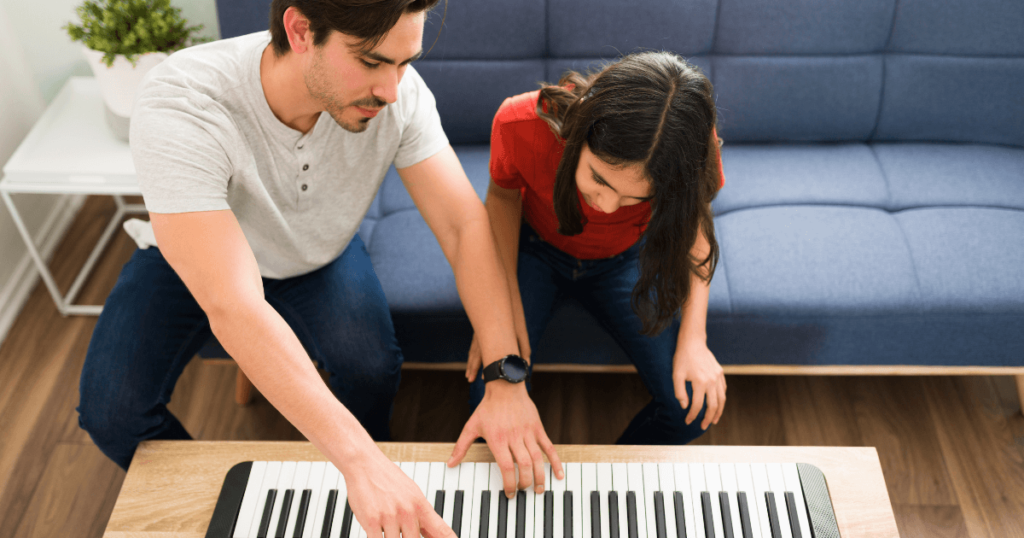Are you passionate about music and interested in learning to play the piano? Private Piano Lessons can be the perfect place to embark on your musical journey. Whether you’re a beginner or an experienced pianist looking to refine your skills, a private piano lesson offers a structured and supportive environment to nurture your talent. In this article, we will explore twelve benefits of enrolling in a private piano lesson and how it can help you unlock your musical potential.
Here are the 12 benefits:
#1 Building a Strong Foundation

Imagine playing effortlessly, your fingers dancing across the keys. Private lessons lay the groundwork for this dream. Experienced teachers guide you through proper hand positioning, posture, and finger coordination, ensuring you develop healthy habits from the start. This solid foundation prevents bad habits and sets you up for success as you progress.
#2 Structured Learning
No more wandering aimlessly through music sheets! Private lessons provide a structured curriculum, taking you from beginner to advanced levels. You’ll delve into music theory, sight-reading, ear training, and even music history, building a well-rounded understanding of the musical world. Each step of the way, you’ll track your progress and witness your skills blossom.
#3 Expert Guidance: Your Personal Maestro

One of the most significant advantages of private lessons is your dedicated teacher. These passionate professionals possess a wealth of knowledge and understand the intricacies of piano pedagogy. They tailor their approach to your strengths and weaknesses, offering personalized guidance and constructive feedback to help you shine.
#4 Unlocking the Power of High-Quality Instruments and Resources
Imagine practicing on a magnificent piano, its rich tones filling the room. Private lessons often provide access to top-quality instruments, ensuring you learn and perform on the best available tools. Plus, you’ll gain access to a treasure trove of learning resources like sheet music, reference books, and digital tools, all designed to elevate your learning experience and broaden your musical horizons.
#5 Practice Makes Perfect: Building Discipline, One Keystroke at a Time

Learning the piano isn’t just about talent; it requires dedication and consistent practice. Private lessons instill good practice habits, emphasizing the importance of focused sessions. With your teacher’s guidance, you’ll learn effective practice techniques, enabling you to make steady progress and achieve your musical goals efficiently.
EXPLORE OUR MUSIC COACHING SERVICES AT BOWLAKE
#6 Step into the Spotlight: Performance and Collaboration Opportunities

Private lessons aren’t just about solitary practice. Many studios organize recitals, concerts, and even competitions, providing you with the exciting opportunity to showcase your skills in front of an audience. These experiences not only boost your confidence but also foster a sense of community and encourage collaboration with fellow musicians, allowing you to learn from and inspire each other.
#7 Tailoring Your Learning Journey: Individual or Group Lessons
Whether you thrive in one-on-one settings or enjoy the energy of group learning, private lessons cater to your unique needs and learning style. Individual lessons offer personalized attention, allowing your teacher to focus on your specific goals and challenges. Group classes, on the other hand, provide a dynamic environment where you can interact with peers, learn from each other’s experiences, and find motivation in a shared passion for music.
EXPLORE OUR MUSIC COACHING SERVICES AT BOWLAKE
#8 Beyond Technique: Cultivating Musical Appreciation and Theory Knowledge
Private lessons go beyond simply teaching you how to play notes. They cultivate your appreciation for music itself and delve into the fascinating world of music theory. Understanding musical concepts and structures deepens your interpretation of pieces and allows you to connect with music on a deeper level.
#9 Developing Technical Skills and Posture is Easier with Private Piano Lessons
Technique is the cornerstone of great piano playing. Private lessons dedicate time to developing proper finger techniques, hand independence, and precise control. They also focus on maintaining a relaxed posture, ensuring you avoid strain and injury during extended practice sessions.
#10 Private Piano Lessons Help To Embrace Challenges

Learning the piano is a journey, not a sprint. There will be challenges and moments of frustration. But private lessons provide a supportive environment where these challenges are embraced as opportunities for growth. With your teacher’s encouragement and guidance, you’ll develop the resilience and perseverance needed to overcome obstacles and achieve your musical goals.
At Bowlake Just Choose a Teacher and start learning
#11 Helps To Build Confidence
As your skills progress and you master pieces, private lessons nurture your confidence and self-expression. The piano becomes your canvas, allowing you to convey your emotions and connect with others through the language of music. You’ll gain a sense of accomplishment and belief in your abilities, empowering you to express yourself in new and exciting ways.
#12 Private Piano Lessons Helps You Explore Your Creativity
Private lessons don’t just teach you to play established pieces; they encourage you to explore your own creativity. Through improvisation and composition exercises, you’ll discover your unique musical voice and expand your creative horizons beyond playing established pieces.

